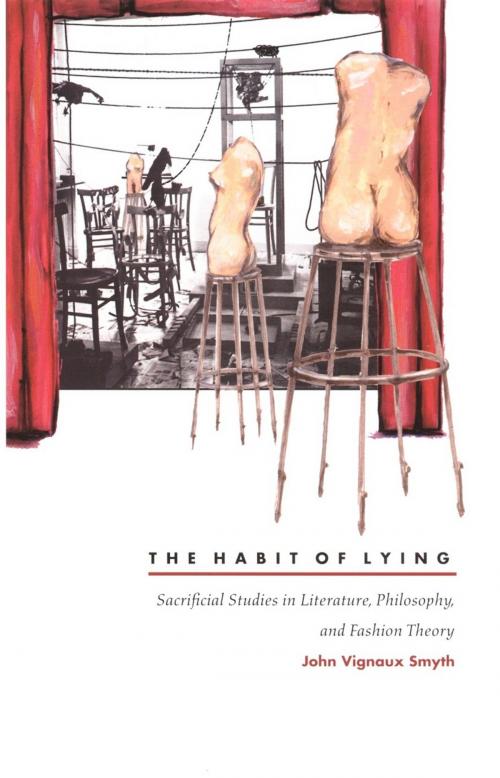The Habit of Lying
Sacrificial Studies in Literature, Philosophy, and Fashion Theory
Nonfiction, Family & Relationships, Relationships, Interpersonal Relationships| Author: | John Vignaux Smyth | ISBN: | 9780822383741 |
| Publisher: | Duke University Press | Publication: | March 18, 2002 |
| Imprint: | Duke University Press Books | Language: | English |
| Author: | John Vignaux Smyth |
| ISBN: | 9780822383741 |
| Publisher: | Duke University Press |
| Publication: | March 18, 2002 |
| Imprint: | Duke University Press Books |
| Language: | English |
Lying appears to be ubiquitous, what Franz Kafka called "a universal principle”; yet, despite a number of recent books on the subject, it has been given comparatively little genuinely systematic attention by philosophers, social scientists, or even literary theorists. In The Habit of Lying John Vignaux Smyth examines three forms of falsification—lying, concealment, and fiction—and makes a strong critique of traditional approaches to each of them, and, above all, to the relations among them.
With recourse to Rene Girard, Paul de Man, Theodor Adorno, Leo Strauss, and other theoreticians not usually considered together, Smyth arrives at some surprising conclusions about the connections between lying, mimesis, sacrifice, sadomasochism, and the sacred, among other central subjects. Arguing that the relation between lying and truthtelling has been characterized in the West by sharply sacrificial features, he begins with a critique of the philosophies of lying espoused by Kant and Sissela Bok, then concludes that the problem of truth and lies leads to the further problem of the relation between law and arbitrariness as well as to the relation between rationality and unanimity. Constructively criticizing the work of such philosophers as Bertrand Russell, Ludwig Wittgenstein, Richard Rorty, and Nelson Goodman, Smyth shows how these problems occur comparably in fiction theory and how Paul de Man’s definition of fiction as arbitrariness finds confirmation in analytic philosophy. Through the novels of Defoe, Stendhal, and Beckett—with topics ranging from Defoe’s treatment of lies, fiction, and obscenity to Beckett’s treatment of the anus and the sacred—Smyth demonstrates how these texts generalize the issues of mendacity, concealment, and sacrificial arbitrariness in Girard’s sense to almost every aspect of experience, fiction theory, and cultural life. The final section of the book, taking its cue from Shakespeare, elaborates a sacrificial view of the history of fashion and dress concealment.
Lying appears to be ubiquitous, what Franz Kafka called "a universal principle”; yet, despite a number of recent books on the subject, it has been given comparatively little genuinely systematic attention by philosophers, social scientists, or even literary theorists. In The Habit of Lying John Vignaux Smyth examines three forms of falsification—lying, concealment, and fiction—and makes a strong critique of traditional approaches to each of them, and, above all, to the relations among them.
With recourse to Rene Girard, Paul de Man, Theodor Adorno, Leo Strauss, and other theoreticians not usually considered together, Smyth arrives at some surprising conclusions about the connections between lying, mimesis, sacrifice, sadomasochism, and the sacred, among other central subjects. Arguing that the relation between lying and truthtelling has been characterized in the West by sharply sacrificial features, he begins with a critique of the philosophies of lying espoused by Kant and Sissela Bok, then concludes that the problem of truth and lies leads to the further problem of the relation between law and arbitrariness as well as to the relation between rationality and unanimity. Constructively criticizing the work of such philosophers as Bertrand Russell, Ludwig Wittgenstein, Richard Rorty, and Nelson Goodman, Smyth shows how these problems occur comparably in fiction theory and how Paul de Man’s definition of fiction as arbitrariness finds confirmation in analytic philosophy. Through the novels of Defoe, Stendhal, and Beckett—with topics ranging from Defoe’s treatment of lies, fiction, and obscenity to Beckett’s treatment of the anus and the sacred—Smyth demonstrates how these texts generalize the issues of mendacity, concealment, and sacrificial arbitrariness in Girard’s sense to almost every aspect of experience, fiction theory, and cultural life. The final section of the book, taking its cue from Shakespeare, elaborates a sacrificial view of the history of fashion and dress concealment.















